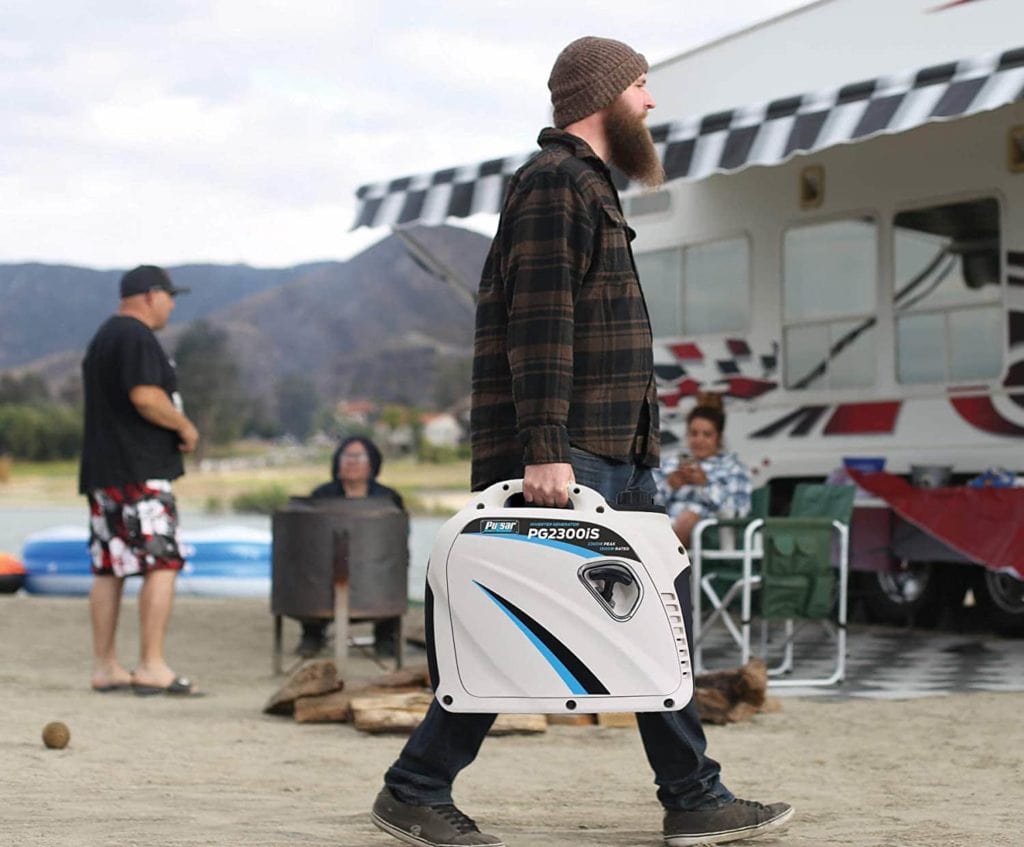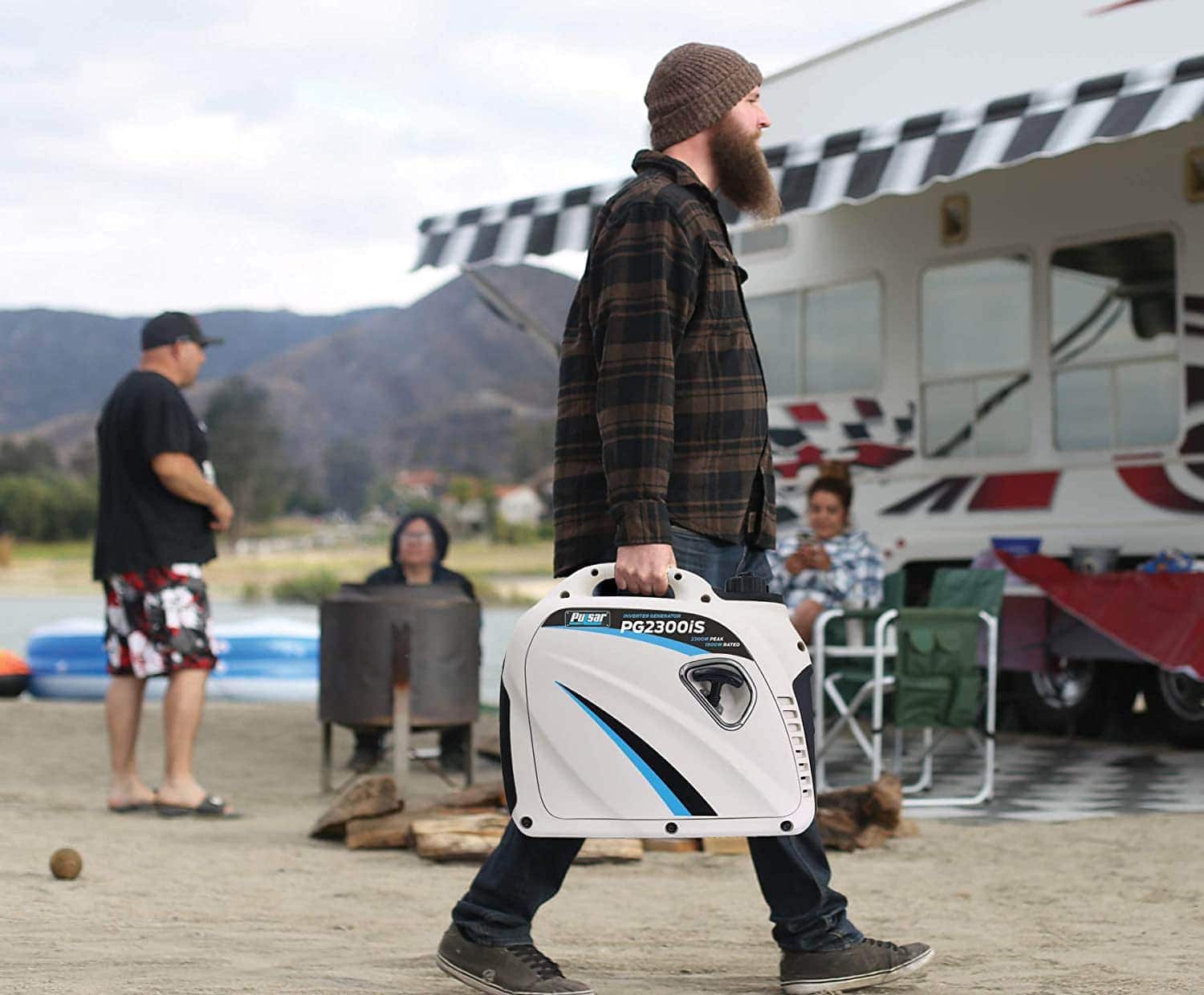What Is an Inverter Generator and How Does It Work?
-
Pete Ortiz
- Last updated:

Are you thinking about buying a portable generator? You’re not the only one – the global market for portable generators is worth nearly 2 billion dollars and is expected to steadily rise in the next several years. Maybe you’re worried about the frequency and violence of storms, the decaying infrastructure of the power grid, or the possibility of terrorism. Or maybe you want a generator to power your TV while you tailgate at the big games, or to hook up to your RV, or to carry along while you’re camping.
It used to be that if you wanted a generator, you had only one option. But recent years have seen the rise of a new player in the field of portable generators: the inverter generator.
But before we can tell you all about the inverter generator, you’ll need a little Generator 101.
What is a Generator?
At a very basic level, a generator converts energy generated by a fossil fuel into electricity.
A traditional generator provides you with effective but “sloppy” electricity – imagine a 5-year-old’s drawing of a person. You’ll recognize it as a person, but maybe the eyes are different sizes, or it’s got only one arm.
The electricity you get from the power company, though, is nice and neat, like an artist’s rendering of a person.
The electrical devices that you grew up with – kitchen appliances, lamps, hair dryers, clock radios – they didn’t really care if the electricity was sloppy or neat. They weren’t picky.
But nowadays, an increasing number of the electrical devices that you use every day – computers, cell phones, TVs – are picky. These gizmos we now live with are sensitive and they can’t always tolerate the sloppy electricity. In fact, the sloppy electricity can destroy them. This isn’t an issue if you have a steady stream of electricity from the power company, but it can be when you don’t.
And if you have newer kitchen appliances or even power tools? Those might be sensitive flowers now, too, and might be ruined by that sloppy power.

What’s Special About an Inverter Generator?
The inverter generator protects your gadgets
An inverter generator provides the neat and clean electricity your modern electronics need. The inverter generator still produces the sloppy electricity, just like a traditional generator, but it takes an extra step or two to clean it up and make it safe to consume for your gadgets. And since your hair dryer, clock radio, and lamps don’t care either way, they’re happy with the cleaned-up electricity as well.
More fuel efficient
Although inverter generators use fossil fuels – gasoline, diesel, or propane – just like a traditional generator, unlike their traditional cousins, they only make enough electricity to meet demand. The old-fashioned generator has just one speed – on – but an inverter will power up and power down as your devices use or don’t use power. As a result, the inverter generator uses less fuel than a regular generator, making it the more environmentally-friendly choice.

Lighter and smaller
Inverter generators are truly portable. They are smaller and lighter than regular generators, meaning you can throw them into your truck and easily take them along. Although traditional generators are described as portable, even small ones are bulky and heavy, stretching the boundaries of portability.

Quieter
Another huge selling point of an inverter generator is how quiet they are. You can hear a regular generator from miles away because they are so loud, so having them around for tailgating or camping is just impossible. But you can stand next to an inverter generator and have a conversation. Plus, since the inverter generator powers up and down based on demand, its noise does, too. If you’re not asking it to do very much, it will make less noise. The standard generator has that one gear – on – and the resulting one sound – loud.
But they aren’t perfect
You knew there was a “but” coming, didn’t you? Inverter generators have a lot to recommend them, but they have two chief drawbacks.
Cost
They cost more. This makes sense since they clean up the electricity and do so in a smaller, lighter, quieter, more fuel-efficient package. But you could easily spend 2-3x as much on an inverter generator.
Can’t handle volume
You can’t buy an inverter generator that can power your entire house, or even most of it. They just don’t have the capacity. If you’re hoping to use the same generator for tailgating that you use for your hot water heater, refrigerator, and dryer during the next power outage, you may have to reevaluate. You can get a second inverter generator, and hook them together to handle some additional demand, but you’re still going to have a much smaller capacity than the standard traditional generator.
Conclusion
Lightweight, quiet, and fuel-efficient, the inverter generator is a great device to have on hand to power your most sensitive electronics during an outage or to bring along on your recreational activities. They will cost you a little more, but if they keep you from going deaf and from replacing all your phones and computers, they are an investment well-worth considering.
See Also: Conventional vs Inverter Generators: What’s the Difference?
- https://learn.sparkfun.com/tutorials/alternating-current-ac-vs-direct-current-dc
- https://www.consumerreports.org/inverter-generators/pros-and-cons-of-inverter-generators/
- https://sciencestruck.com/how-does-generator-work
- https://yamahaef2000is.com/conventional-generator-vs-inverter-generator/
- https://www.nytimes.com/2013/04/25/business/energy-environment/generators-become-must-have-appliances-in-storm-battered-areas.html
- https://www.marketsandmarkets.com/Market-Reports/portable-generator-market-195875841.html
- https://www.consumerreports.org/cro/generators/buying-guide/index.htm
Featured Image Credit: Amazon
Contents


